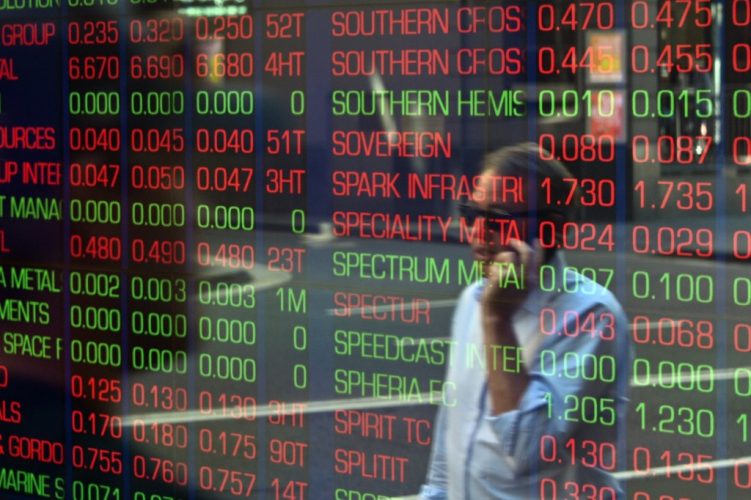Asian stocks slipped the most in two weeks on Monday as concern about rapid US rate rises and slowing growth troubled investors.
China’s CSI300 index was close to a 23-month low with the Shanghai composite index hovering just above the key 3,000-point level, as China’s zero-Covid policy and monetary-easing restraint erodes investor sentiment.
The CSI300 index fell 2.2% to 3,925.30 points at the end of the morning session, while the Shanghai Composite Index lost 2.4% to 3,012.18 points.
Both indexes have erased all gains made since Vice Premier Liu He’s pledge on March 16 to support the economy and financial markets.
The Hang Seng index was down by 2.8% to 20,105.32 points at noon local time, with tech giants and mainland developers shedding nearly 3% each.
There were reports that some Chinese state banks would cut deposit rate ceilings on Monday, a week after regulators encouraged smaller banks to do so, but the news failed to lift sentiment.
Analysts and traders said the key issue was whether China would loosen its zero-Covid policy which is worsening its growth outlook, while a less-than-expected reserve ratio cut and rate reductions added to their disappointment.
Most sectors fell, with resource stocks slumping 4.7% to lead the decline, while semiconductors and new energy shares both dropped about 3.8%.
Banks were down 2.8%, as lower deposit rates are expected to hurt their margins, led by a 6.4% decline in China Merchants Bank as its ex-president, Tian Huiyu, is “suspected of serious violations of disciplines and laws” and is being investigated.
As Shanghai grapples with a major Covid outbreak amid prolonged strict lockdowns, Beijing kicked off three rounds of mass testing for all residents of its biggest district, Chaoyang, on Monday after dozens of cases were reported.
Yuan Sinks, Markets Follow US Lead
Markets in other regional centres were also hit, with the Nikkei fell 1.9% in Japan, while MSCI’s broadest index of Asia-Pacific shares outside Japan slid 1.6% to a six-week low. India’s Nifty 50 was down 0.76% in early trading.
Meanwhile, China’s yuan fell to a one-year low against the dollar on Monday, extending losses after posting its worst week since 2015, as the worsening economic growth outlook drove concern that the currency had more room to fall.
The euro was broadly steady at $1.0802, compared with broad dollar gains elsewhere, and it touched an almost two-month high against a struggling sterling.
French President Emmanuel Macron comfortably defeated a far-right challenge, reassuring markets about France’s commitment to an integrated Europe, even if his economic platform now depends on parliamentary elections in June.
The global backdrop of high inflation and wide expectation of a series of rate rises have been pounding bond markets for months – exacerbated by war in Ukraine and disruption from Covid lockdowns in China.
US shares tumbled at the end of last week after Federal Reserve chairman Jerome Powell said a 50-basis-point rate hike was on the table at the Fed’s meeting in May and St Louis Fed president James Bullard floated the idea of 75bp hikes.
“Concerns around rates and recession are now the biggest risks for investors,” Candace Browning, head of global research at Bank of America, said.
Brent crude futures dropped 2.7% to a two-week low of $103.88 a barrel, while US crude futures fell 2.6% to $99.38 a barrel.
Commodity Prices Slip in Asia
Copper and iron ore also fell in Asia, though soybean oil jumped after an Indonesian ban on palm oil export.
The week ahead is headlined by US growth data due on Thursday, European inflation figures due on Friday and a monetary policy meeting for the Bank of Japan.
Investors expect US growth to steady around 1.1%, far slower than the Covid-19 rebound-juiced figures of the recent past, but probably robust enough to bear rate rises.
The BOJ meeting will also be closely watched for any adjustments to economic projections or any signs of a policy response to the yen, which has tumbled more than 10% in two months.
Bitcoin held on just above resistance at $40,000.
- Reuters with additional editing by Jim Pollard
ALSO READ:
Asian Markets Hit by Inflation Fears, China Slowdown
Shanghai Data Shows Severe Retail Slump in March
Turmoil in Asian Markets as Shares Sink and Oil Soars
























